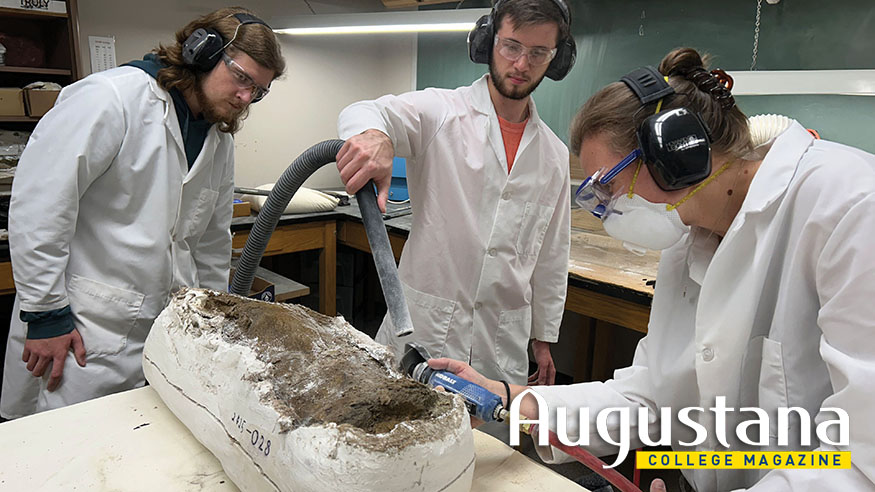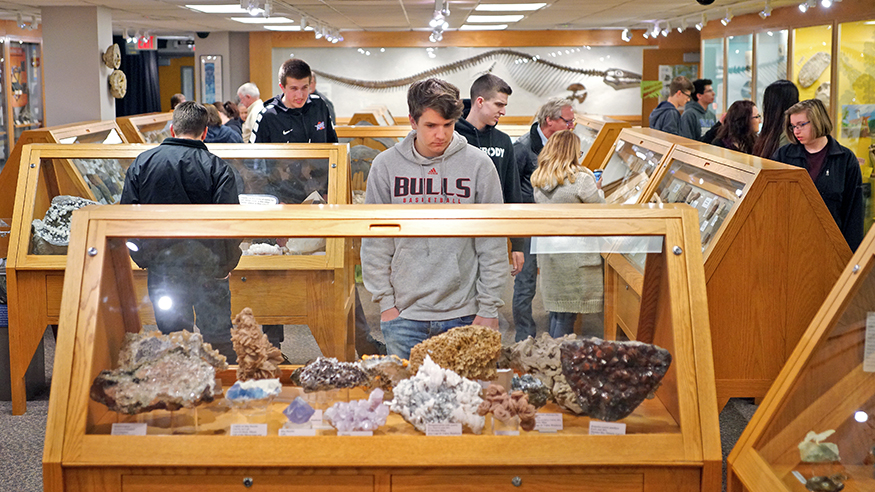
Triceratops gets star treatment in Swenson lab
A historic discovery is taking shape in the basement of Augustana’s Swenson Hall of Geosciences.
2025-26 catalog
KELSEY M. ARKLE, Associate Professor,
B.A., Cornell College; M.S., Ph.D., University of Cincinnati
JEANETTE C. ARKLE, Professional Faculty, Assistant Professor, Program Manager of the Upper Mississippi Center
B.A., B.S., M.S., CSU Fullerton; Ph.D., University of Cincinnati
JEFFREY C. STRASSER, Professor, Chair
B.A., Carleton; M.S., Ph.D., Lehigh
MICHAEL B. WOLF, Professor, Fritiof M. Fryxell Chair in Geology
A.B., Hamilton; M.S., Ph.D., Caltech
MAJOR IN GEOLOGY. 40 credits: One gateway GEOL course (GEOL-101, GEOL-105, GEOL-112, or GEOL-123); six core courses (GEOL-201, GEOL-205, GEOL-240, GEOL-309, GEOL-350, GEOL-360), three senior inquiry courses (GEOL-450, GEOL-451, and GEOL-452); and two additional elective GEOL courses (including GEOG-273, GEOG-306, and ENVR-300).
Upper-level geoscience courses assume math skills equivalent to those covered in a high school or college pre-calculus course. Students planning to pursue graduate studies or careers in the geosciences are strongly recommended to take MATH-160 (Calculus) as well as additional courses in chemistry, physics, mathematics, geography, and/or biology.
MINOR IN GEOLOGY. 17 credits (4 courses + 1 credit), including one gateway course (GEOL-101, 112, 105, 112, or 123), GEOL-399 (1-credit), and 12 additional credits (or 3 courses) from GEOL courses at or above the 200-level. GEOG-273, GEOG-306, and ENVR-300 may be substituted for GEOL courses. GEOL-399, coordinated with a faculty member, requires completion of a research paper that addresses some aspect of geology and relates it to the student’s primary major, and it must incorporate an additional reflective component demonstrating an understanding of the connectivity between subject areas. This paper could conceivably be an extension of the Senior Inquiry effort within the student’s primary major.
GEOLOGY MAJOR WITH DISTINCTION. Students can earn a departmental distinction upon successful completion of a superior senior research thesis, GEOL-451, and the geology degree with a grade-point average of at least 3.50 for all geology courses and the supporting courses that are required for the major, and demonstrated leadership and service roles within the department.
GEOLOGY MAJOR WITH MERIT. Students can earn this departmental honor upon successful completion of either a superior senior research thesis, GEOL-451, or the geology degree with a grade-point average of at least 3.50 for all geology and supporting courses that are required for the major.
The subject of geology addresses both the materials that form the Earth and the processes of Earth formation and evolution. Sub-disciplines include but are not limited to: study of life and evolution as preserved in the rock record; study of resources upon which our industrial society is based; study of environmental problems and remediation solutions; study of geologic hazards and hazard mitigation. The interdisciplinary study of geology relies upon mastery of geological principles and oral and written communication skills as well as the application of fundamental principles of physics, chemistry, biology and mathematics to complex Earth systems.
Grade Point Average Notation: All courses listed in the catalog as required courses for any major and/or minor, including those courses outside of the department or with a different subject coding, are considered part of the major and will count in the grade point average. Some departments may have additional grade requirements for the courses offered within their department. Recommended supporting courses that are optional and not required may also count in the major depending on the program. For more information see your department chair or the degree requirements for Bachelor of Arts and information on Majors/Minors.

A historic discovery is taking shape in the basement of Augustana’s Swenson Hall of Geosciences.

Augustana's John Deere Planetarium and Fryxell Geology Museum will be open to the public on Saturday, Nov. 1, for the annual Fall Open House. The planetarium and geology museum will be open 7-8:30 p.m., with indoor and outdoor programs. There is no charge for admission.

Community-based learning on a large scale: Augustana geology students travel with faculty to the Caribbean island of Bonaire to research environmental change in coral reefs.